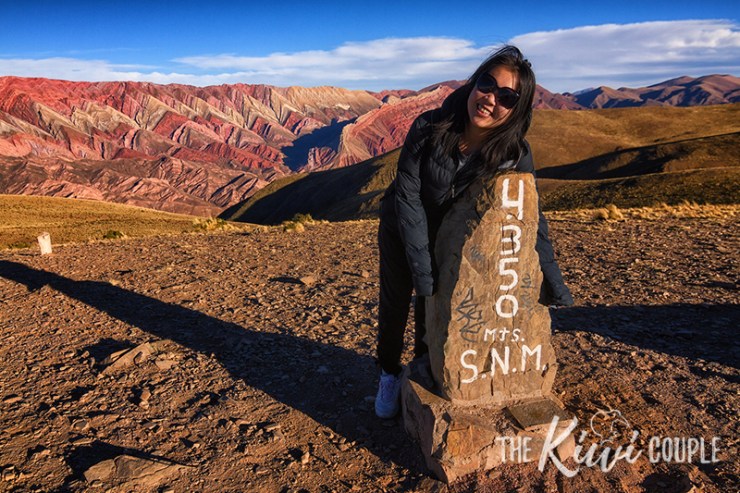I’ve struggled with migraines since I was a teen, thanks to my wonderful genes (shout out to my Mum and Goong Goong!). I was always fearful when I was younger that it would impact my chances of getting a job in my industry – I’ve thrown up at work in secret, kept it hidden from employers, and made some questionable choices on pushing myself. Nowadays my health comes first, and I try to have balance in life! A concern when planning our first big trip was how I’d juggle travel and migraines – with added stress, pressure and the new lifestyle.
There’s obviously no magical answer as people have different triggers, types, and their own way of dealing with a migraine attack. I’m also lucky that mine aren’t as severe as others, and I can handle them with medication. Travel and migraines can go hand in hand, but hopefully you don’t have that experience. These are just some of the things that help me:
Carry medicine with you at all times
This is something I apply to travels, as well as my everyday life when I’m settled in a city. I have a little silver case full of medicine. Ranging from panadeine for smaller, manageable headaches, to prescription meds and nausea meds – for whenever that attack starts. I’ve taken it onto The Great Wall of China, to Machu Picchu, wherever I go – it goes! Jeremy knows where it is, so if I’m in too much pain to sort it, he can get me exactly what I need.

Avoid your triggers!
Everybody has different triggers and it’s important to try and identify them. For me it’s often stress, looking at a computer screen for too long, bright lights and not enough sleep. Jeremy understands that there are times I can’t be in a restaurant with flashing lights in my face or sometimes I can’t exert myself at all since it makes my heart beat faster, causing my head to pound. When you travel you want to schedule everything to the max. I have to step back and understand that if I do too much, it could mean a longer recovery period at the other end. What’s the point in having an fully packed day, if you’re out of action the next day?

Hydration is key
Carry a water bottle wherever you go and try to actively hydrate. It’s so easy to forget about drinking water when you’re in a new (exciting) place and dehydration definitely can lead to migraines or headaches.

Listen to your body – do what works for you
For me, it’s taking medication at the beginning stages of a migraine and seeking out caffeine. That could be a nightmare for you! For some people, they need to eat something straight away or take a nap. Make sure you’re prepared for what you need, by carrying food, a certain drink etc. And don’t be shy to let your travelling companions know – they’re not mind-readers.

Be aware of new circumstances
When we started travelling in South America we spent long periods of time at higher altitudes than I was used to. I had no idea how this was going to affect me, and the headaches and nausea I experienced rising up to 5000m in a few hours….ouch. Yuck. I wished I’d taken medication earlier, or taken a different route to help me acclimatise slower. Anything to avoid making friends with that toilet bowl in Bolivia! But don’t be fearful, just be prepared. I’m still glad for that experience even though it was rough – I’ll never underestimate altitude again.

Prepare when you can
I’ve developed hormonal migraines over the last few years (yay…) meaning that once a month, I get an attack – but at least I can expect those ones. I’m aware of when I’m going to have a hard time, so I try to calm down and take it easy.

Don’t feel guilty about resting
I struggle (and have heard from a lot of people in the same boat) with not doing enough, feeling like I’m missing out, and being ungrateful for taking time to breathe and recover. Rest days are key to keeping your body healthy and ready to go for the rest of your trip. Occasionally the symptoms are bad, so I need an afternoon in a dark room – and that’s okay. No need to beat yourself up over it!

Be flexible!
I want to do everything. I love being active, having adventures and I don’t want to have “what ifs”. Being flexible when travelling allows for those occasional sick days, and I can still get the most out of my trip. I’m thankful that I was able to spend half a day in Tilcara holed up in a dark room, and visit Humahuaca the next day. I didn’t have to force myself into any rigid schedule – let the plans fit around you and what your body needs!

So many people suffer from migraines – and they truly suck! Nobody wants a combo of travel and migraines – you’re heading off for a holiday, not to be sick. If you’re struggling, chat to your doctor about what else you can do. One funny thing is that when we set off on a long trip, my migraines do get less frequent after a couple of months. I’m guessing it’s due to a lower stress level and less screen time (no office work!). Travel doesn’t make them disappear (thanks hormones) but it’s definitely helped me. I hope that you all can have wonderful travels with minimal migraines!

